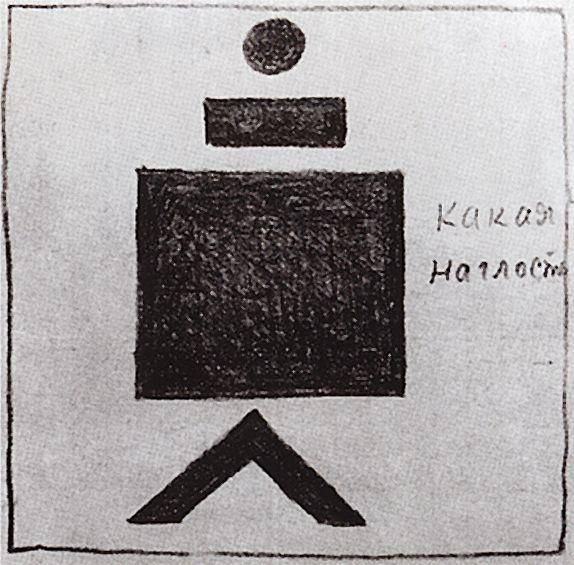Description
In the vast universe of the art of the twentieth century, Kazimir Malevich emerges as a central and innovative figure, whose work challenged and redefined the rules of conventional aesthetics of his time. His 1915 painting, what an impudence! It is a dreamlike and bold manifestation of the evolution of his style towards suprematism, movement he founded and that he sought to transcend the mere representation to achieve the pure essence of emotion and perception.
When observing, what an impudence! One cannot avoid being absorbed by the vibrant collage of shapes and colors that dominate the canvas. This work, characterized by a cacophony of geometric elements that float and juxtapose in a seemingly unlimited space, is a clear sample of Malevich's commitment to absolute abstraction. Dark and terrible tones predominate, with brightly colored touches that create a disturbing visual dynamism. At first glance, the work looks like a puzzle of figures that defy traditional spatial logic, evoking a sense of organized disorder.
The composition is an exercise of balance between the chaotic and the structured. Geometric shapes you find in constant tension: a triangular figure overlaps a rectangular, while circles and semi-cuts seem to float freely, challenging gravity and perspective. Each element seems to be involved in a silent dialogue with the other, creating a sense of continuous movement and fluidity. This set of tensions and harmonies is, without a doubt, a representation of Malevich's vision about a new artistic reality, one that does not need to resort to the familiarity of the physical world to transmit his message.
It is important to note that Malevich does not stop at the merely aesthetic. The choice of the title, what an impudence! It suggests a provocation, an invitation to question the expectations of the spectator and the audacity of a work that, at the time, could have been seen as a gesture of artistic insubordination. This "impudence" could be interpreted as a reference to Malevich's daring to break with academic traditions and venture into unknown territories of art and perception.
The work does not present characters in the traditional figurative sense, but calls geometric entities to assume a leading role. The absence of human figures and disconnection with conventional narrative contexts emphasize Malevich's intention to strip the art of any earthly reference that could limit its pure expressive capacity. Instead of resorting to recognizable scenes, what an impudence! Open a portal to an emotional and conceptual dimension, inviting the viewer to immerse themselves in an almost metaphysical experience.
In the context of Malevich's artistic trajectory, what an impudence! marks a crucial point in its exploration of suprematism. Although this specific work is not as famous as its iconic "black square on white background", it shares the same intention to free the art of representation obligations and celebrate the supremacy of pure sensitivity. This series of principles would be manifested again and again in their work, solidifying its legacy as one of the revolutionaries of abstract art.
Malevich, like other protagonists of the abstract art of the early twentieth century, such as Kandinsky and Mondrian, sought a form of expression that transcended the visual to address the spiritual. But unlike his contemporaries, Malevich's vision about abstraction was more radical, trying to distill the artistic experience until his most pure and fundamental essence.
In summary, what a rude one! It is a work that challenges, causes and expands the limits of artistic perception. Through its bold combination of shapes, colors and disposition, Kazimir Malevich offers us a window to the universe of suprematism, reminding us that art, in its purest form, has the power to transcend reality and connect directly to the deepest recesses of the human experience. This painting It is a sample of Malevich's overflowing creative energy, one that continues to resonate deeply in the canon of modern art.
KUADROS ©, a famous paint on your wall.
Hand-made oil painting reproductions, with the quality of professional artists and the distinctive seal of KUADROS ©.
Art reproduction service with satisfaction guarantee. If you are not completely satisfied with the replica of your painting, we refund your money 100%.

